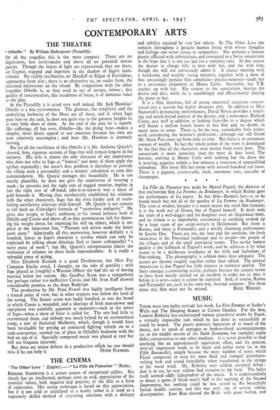CONTEMPORARY ARTS
THE THEATRE
Othello." By William Shakespeare (Piccadilly).
OF all the tragedies this is the most compact. There are no digressions, few irrelevancies and above all no potential rescue parties. Though the forces of light are represented, they are there, on Cyprus, trapped and impotent in the shadow of Iago's male- volence. No visible retribution, no Macduff or Edgar of Fortinbras, approaches from afar ; there is no alternative to, no outlet from, the poisoned microcosm on the island. By comparison with the other tragedies Othello is, as they used to say of revues, intime ; this quality of concentration, this steadiness of focus, is of immense value to the play.
At the Piccadilly it is acted very well indeed. Mr. Jack 'Hawkins' Othello is a fine performance. The glamour, the simplicity and the underlying barbarity of the Moor are all there, and if, when Iago puts him on the rack, he does not quite rise to the greatest heights he is very little short of them. At the end of the play he is superb. His sufferings all but over, Othello—like the dying bear—makes a simpler, more direct appeal to our emotions becausehis own are now relatively uncomplex ; and here Mr. Hawkins is intensely moving.
But for all the excellence of this Othello it is Mr. Anthony Quayle's shrewd, firm, vigorous account of Iago that will remain longest in the memory. His wife is almost the only character of any importance who does not refer to Iago as "honest," and most of them apply the epithet repeatedly ; the actor's first problem is therefore to provide the villain with a personality and a manner calculated to earn this commendation. Mr. Quayle manages this beautifully. He is not merely plausible, he does not give the impression of wearing a mask • he presents just the right sort of rugged exterior, implies in just the right sort of off-hand, take-it-or-leave-it way a heart of gold beneath it. Having thus satisfactorily established his relations with the other charaCters, Iago has the even harder task of estab- lishing satisfactory relations with himself. Mr. Quayle is not content to fall back on Coleridge's formula of "motiveless malignity." He gives due weight to Iago's ambition to his sexual jealousy both of Othello and Cassio and above all to that promiscuous itch for throw- ing his weight about, for imposing his will on others, which is im- plicit in the important line Pleasure and action make the hours seem short." Admittedly all this motivation, however skilfully it is handled, leaves in Iago's character a residue which can only be explained by talking about Absolute Evil or (more colloquially) "a nasty piece of work "; but Mr. Quayle's interpretation places the minimum of reliance on these facile imponderables. It is really s splendid piece of acting.
Miss Elizabeth Kentish is a good Desdemona, but Miss Fay Compton Emilia erred, I thought, on the side of gentility with Iago played as (roughly) a Warrant Officer she had the air of having married below her station. Mr. Geoffrey Keen was a sympathetic but perhaps rather too ineffective Cassio, and Mr. Ivan Staff showed considerable promise as the dupe Roderigo. The production by Mr. Peter Powell was highly intelligent from a textual point of view, but in other respects was below the level of the acting. The Senate scene was badly handled, as was the brawl in which Cassio is wounded, and a shortage of both man-power and equipment was painfully apparent at moments—such as the arrest of Iago—when a show of force is called for. The sets had little to recommend them, and nobody was much helped by an asymmetrical tamp, a sort of theatrical Mulberry, which, though it would have been invaluable for getting an armoured fighting vehicle on to a tank-transporter, seemed out of place in Othello's bedroom with the bed on top of it. Specially composed music was played at rare but still too frequent intervals. But these are minor defects in a production wriich no one should


































 Previous page
Previous page